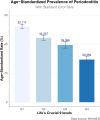Central adiposity indices and inflammatory markers mediate the association between life's crucial 9 and periodontitis in US adults
- PMID: 40462074
- PMCID: PMC12131473
- DOI: 10.1186/s12944-025-02619-1
Central adiposity indices and inflammatory markers mediate the association between life's crucial 9 and periodontitis in US adults
Abstract
Background: Periodontitis, a chronic inflammatory disease, is closely linked to cardiovascular health. While Life's Essential 8 (LE8) evaluates cardiovascular metrics, recent recommendations suggest incorporating psychological health (PHQ-9) to form Life's Crucial 9 (LC9). However, evidence regarding the utility of LC9 in periodontal disease remains limited.
Methods: We analyzed data from 7,674 adults in the 2009-2014 NHANES cycles. LC9 scores were calculated by integrating LE8 and PHQ-9 metrics, then categorized into quartiles. The association between LC9 and periodontitis was examined using weighted logistic regression, restricted cubic spline (RCS), subgroup and WQS analyses. Mediation analysis assessed the roles of central adiposity (ABSI, WWI) and systemic inflammation (SII, SIRI).
Results: Higher LC9 scores were associated with lower periodontitis prevalence (29.4% in highest vs. 52.1% in lowest quartile; P < 0.001), with a 15.5% risk reduction per 10-unit increase (OR = 0.845; 95% CI: 0.795-0.897). WQS analysis identified nicotine exposure, sleep health, blood glucose, blood pressure, and depressive symptoms as key contributors. Mediation analysis showed partial effects through WWI (21.617%), ABSI (10.869%), SIRI (7.120%), and SII (5.351%). LC9 did not significantly outperform LE8 in prediction.
Conclusions: Higher LC9 score is linked to reduced periodontitis prevalence and severity, with central adiposity and systemic inflammation partially mediating this relationship. These findings emphasize comprehensive cardiovascular health management may help reduce periodontal disease risk.
Keywords: Abdominal fat; Cardiovascular health; Central adiposity; NHANES; Oral health; Periodontitis; Systemic inflammation response.
© 2025. The Author(s).
Conflict of interest statement
Declarations. Ethics approval and consent to participate: Participation in the study was voluntary, with all participants providing written informed consent. Ethical approval for the NHANES study was obtained from the RERB of the NCHS. Consent for publication: Not applicable. Competing interests: The authors declare no competing interests.
Figures







References
MeSH terms
Substances
LinkOut - more resources
Full Text Sources

